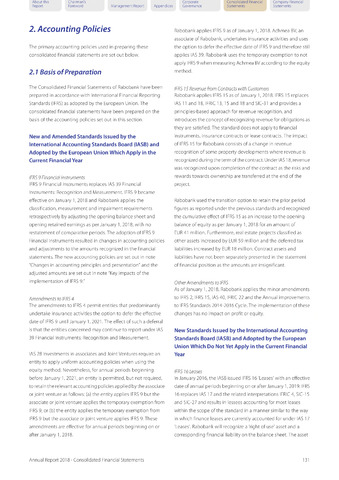2. Accounting Policies
2.1 Basis of Preparation
About this
Report
Chairman's
Foreword
Corporate
Management Report Appendices Governance
Consolidated Financial Company Financial
Statements Statements
The primary accounting policies used in preparing these
consolidated financial statements are set out below.
The Consolidated Financial Statements of Rabobank have been
prepared in accordance with International Financial Reporting
Standards (IFRS) as adopted by the European Union. The
consolidated financial statements have been prepared on the
basis of the accounting policies set out in this section.
New and Amended Standards Issued by the
International Accounting Standards Board (IASB) and
Adopted by the European Union Which Apply in the
Current Financial Year
IFRS 9 Financial Instruments
IFRS 9 Financial Instruments replaces IAS 39 Financial
Instruments: Recognition and Measurement. IFRS 9 became
effective on January 12018 and Rabobank applies the
classification, measurement and impairment requirements
retrospectively by adjusting the opening balance sheet and
opening retained earnings as per January 12018, with no
restatement of comparative periods. The adoption of IFRS 9
Financial Instruments resulted in changes in accounting policies
and adjustments to the amounts recognized in the financial
statements. The new accounting policies are set out in note
"Changes in accounting principles and presentation" and the
adjusted amounts are set out in note "Key impacts of the
implementation of IFRS 9."
Amendments to IFRS 4
The amendments to IFRS 4 permit entities that predominantly
undertake insurance activities the option to defer the effective
date of IFRS 9 until January 1, 2021The effect of such a deferral
is that the entities concerned may continue to report under IAS
39 Financial Instruments: Recognition and Measurement.
IAS 28 Investments in associates and Joint Ventures require an
entity to apply uniform accounting policies when using the
equity method. Nevertheless, for annual periods beginning
before January 1, 2021, an entity is permitted, but not required,
to retain the relevant accounting policies applied by the associate
or joint venture as follows: (a) the entity applies IFRS 9 but the
associate or joint venture applies the temporary exemption from
IFRS 9; or (b) the entity applies the temporary exemption from
IFRS 9 but the associate or joint venture applies IFRS 9. These
amendments are effective for annual periods beginning on or
after January 1, 2018.
Rabobank applies IFRS 9 as of January 1, 2018. Achmea BV, an
associate of Rabobank, undertakes insurance activities and uses
the option to defer the effective date of IFRS 9 and therefore still
applies IAS 39. Rabobank uses the temporary exemption to not
apply IFRS 9 when measuring Achmea BV according to the equity
method.
IFRS 15 Revenue from Contracts with Customers
Rabobank applies IFRS 15 as of January 1, 2018. IFRS 15 replaces
IAS 11 and 18, IFRIC 13,15 and 18 and SIC-31 and provides a
principles-based approach for revenue recognition, and
introduces the concept of recognizing revenue for obligations as
they are satisfied. The standard does not apply to financial
instruments, insurance contracts or lease contracts. The impact
of IFRS 15 for Rabobank consists of a change in revenue
recognition of some property developments where revenue is
recognized during the term of the contract. Under IAS 18, revenue
was recognized upon completion of the contract as the risks and
rewards towards ownership are transferred at the end of the
project.
Rabobank used the transition option to retain the prior period
figures as reported underthe previous standards and recognized
the cumulative effect of IFRS 15 as an increase to the opening
balance of equity as per January 1, 2018 for an amount of
EUR 41 million. Furthermore, real estate projects classified as
other assets increased by EUR 59 million and the deferred tax
liabilities increased by EUR 18 million. Contract assets and
liabilities have not been separately presented in the statement
of financial position as the amounts are insignificant.
Other Amendments to IFRS
As of January 1, 2018, Rabobank applies the minor amendments
to IFRS 2, IFRS 15, IAS 40, IFRIC 22 and the Annual improvements
to IFRS Standards 2014-2016 Cycle. The implementation ofthese
changes has no impact on profit or equity.
New Standards Issued by the International Accounting
Standards Board (IASB) and Adopted by the European
Union Which Do Not Yet Apply in the Current Financial
Year
IFRS 16 Leases
In January 2016, the IASB issued IFRS 16 leases' with an effective
date of annual periods beginning on or after January 1,2019. IFRS
16 replaces IAS 17 and the related interpretations IFRIC 4, SIC-15
and SIC-27 and results in lessees accounting for most leases
within the scope of the standard in a manner similar to the way
in which finance leases are currently accounted for under IAS 17
leases'. Rabobank will recognize a 'right of use' asset and a
corresponding financial liability on the balance sheet. The asset
Annual Report 2018 - Consolidated Financial Statements
131

